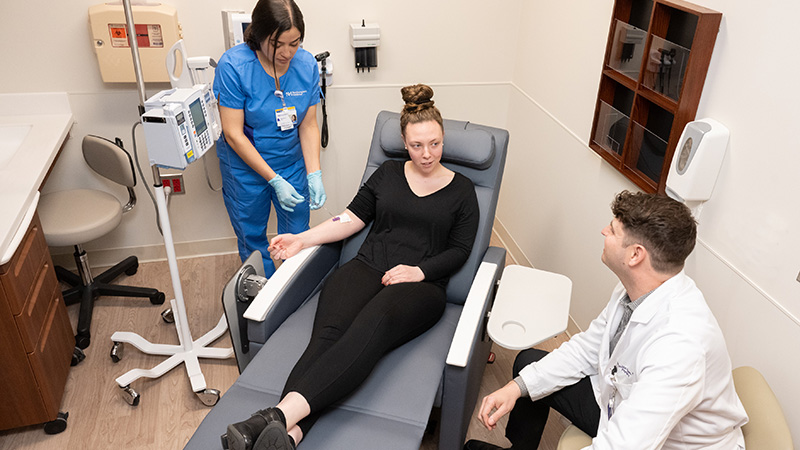Understanding Eating Disorders
Identifying Disordered Eating and How to Help
Updated February 2024
Eating disorders are complex conditions. Treatment and support are no less nuanced. Eating disorders come in many forms and are affected by emotional, physical and social health, requiring treatment plans that are unique to each individual and their circumstances.
Eating disorder types include:
- Anorexia nervosa: An intense fear of gaining weight that prompts someone to not eat enough to maintain a healthy body weight.
- Bulimia nervosa: Repeatedly overeating then taking extreme steps to prevent weight gain, such as vomiting, fasting or over exercising.
- Binge-eating disorder: Repeatedly overeating without purging.
- Avoidant/restrictive food intake disorder: An extreme food aversion not driven by fear of weight gain, but rather by things like the texture, smell or taste of food, or a lack of appetite or interest in food, which leads to weight loss and/or nutritional deficit.
- Pica: Regularly eating something that isn’t food, such as chalk, crayons or paint chips.
- Rumination disorder: Regurgitating food, not related to gastroesophageal reflux disease (GERD), that may be rechewed, swallowed again or spit out.
- Other specified feeding and eating disorders: Having symptoms similar to one or more eating disorders, but not meeting the full medical criteria for these disorders, while still causing similar levels of impairment and distress.
“It is important to address an eating disorder or disordered eating behaviors as early as possible, especially as these symptoms can get harder to treat, and worsen, as time goes on,” says Andrea Graham, PhD, a licensed clinical psychologist and assistant professor at Northwestern University Feinberg School of Medicine. “The good news is that eating disorders are treatable, and evidence-based treatment options exist.”
What to Look For
Disordered eating is often influenced or aggravated by a range of emotional and social factors, including low mood or anxiety, stress, and changing life events. People with difficult personal relationships, a history of physical or sexual abuse, or a history of bullying, particularly due to weight or physical appearance, are also susceptible to disordered eating. Societal or family expectations related to physical appearance can also increase risk.
Eating disorders are treatable, and evidence-based treatment options exist.— Andrea Graham, PhD
There are some common signs. People with eating disorders may often:
- Eat in secret or stop participating in family or group meals
- Cook for others but won’t eat food themselves, or they will take frequent trips to the bathroom after meals
- Have food rituals as well as anxiety related to certain foods
- Avoid or stop eating certain foods or food groups
- Have a change in hair, skin or fingernail quality
- Exhibit mood changes and increased isolation
- Exhibit sudden changes in weight
- Wear clothes that hide body shape
What’s at Stake
Eating disorders can be serious. They have one of the highest mortality rates of all behavioral health disorders. Left untreated, disordered eating can have long-term medical implications such as:
- Acid reflux
- Osteoporosis
- Kidney infections and failure
- Liver failure
- Dental issues
- Infertility
- Muscle loss and weakness
- Esophageal rupture
- Cardiovascular and metabolic issues
Getting Help for Eating Disorders
Since people with eating disorders are at higher risk for suicide and medical complications, it’s important to seek treatment early. Learning the warning signs is the first step to getting appropriate care. If you suspect that you or a loved one may have an eating disorder, contact a physician.
Support is invaluable during this time, especially since eating disorders thrive in isolation. Whether you’re in recovery yourself or helping a loved one, community and education throughout treatment are important. According to Graham, a helpful place to start is the National Eating Disorders Association, which offers education and support to anyone impacted by an eating disorder. For children and adolescents with eating disorders, Katrina T. Obleada, PhD, a pediatric psychologist in the Eating Disorder Program at Ann & Robert H. Lurie Children’s Hospital of Chicago, and assistant professor of Psychiatry and Behavioral Sciences at Northwestern University Feinberg School of Medicine, recommends family-based treatment where parents take the lead in helping their child recover at home with guidance from a trained mental health clinician.
If you or someone you know is experiencing feelings of hopelessness or having thoughts of suicide, call or text the National 988 Suicide & Crisis Lifeline at 988 or chat at 988lifeline.org. In life-threatening situations, call 911.





